Cathie Surname Ancestry ResultsOur indexes 1000-1900 include entries for the spelling 'cathie'. In the period you have requested, we have the following 26 records (displaying 1 to 10): Single Surname Subscription | | | Buying all 26 results of this search individually would cost £152.00. But you can have free access to all 26 records for a year, to view, to save and print, for £100. Save £52.00. More... |
These sample scans are from the original record. You will get scans of the full pages or articles where the surname you searched for has been found. Your web browser may prevent the sample windows from opening; in this case please change your browser settings to allow pop-up windows from this site. Scottish litigants, rebels and cautioners
(1585-1592)
The Privy Council of Scotland exercised a superior judicial authority in the kingdom, and consequently received and dealt with a constant stream of petitions, as well as dealing with the internal security of the state. This register of the council from 1 August 1585 to 31 July 1592, in the reign of king James VI, was edited by David Masson, and published under the direction of the Lord Clerk Register of Scotland in 1881. Some of the individuals mentioned are the complainants, those of whom they complained, and the sureties on both sides: at this period, some of the complainants are alleging serious attacks, often of a feuding nature. Many of the bonds entered into by the cautioners are promises to keep the peace towards such enemies. Failure to answer to the council when summoned was a serious contempt, leading to being denounced a rebel, with serious consequences. But 'horning' was also used in the pursuit of debts: there was no imprisonment for debt in Scotland, but a creditor could have an obstinate debtor ordered, in the sovereign's name, to pay what was due, failing which, the debtor could be put to the horn, denounced as a rebel, and imprisoned as a rebel. The main text (to page 774) is from the Acta Secreti Concilii, containing the minutes of the Privy Council, with intermixed Acta Proper (political edicts), Decreta (judicial decisions), Acta Cautionis (acts of caution) and Bands (registration of bonds). After that are printed some miscellaneous Privy Council documents from the same years: additional acts of caution (775-778); ordinances and acts anent the Borders and the North (779-814); and miscellaneous privy council papers (815-834). The sources most productive of names, the Acta Cautionis and Registration of Bands, are also the most repetitive in form, and are not transcribed verbatim and literatim: nevertheless, one of the editor's rules was for 'All proper names and names of places occurring in the originals to be preserved in the abstracts without exception, and in the exact original spelling.'
CATHIE. Cost: £4.00.  | Sample scan, click to enlarge

| Scottish litigants, rebels and cautioners
(1592-1599)
The Privy Council of Scotland exercised a superior judicial authority in the kingdom, and consequently received and dealt with a constant stream of petitions, as well as dealing with the internal security of the state. This register of the council from August 1592 to May 1599, in the reign of king James VI, was edited by David Masson and published under the direction of the Deputy Clerk Register of Scotland in 1882. The publication brings together the contents of the principal register (Acta Secreti Concilii) with acts and bands (bonds) of caution (surety) from the registers called Acta Cautionis (pp 561-730); Acts and Ordinances relating to the Borders and the North (731-748); and Miscellaneous Privy Council Papers (749-769). Many of the individuals mentioned are the complainants, those of whom they complained, and the sureties on both sides: at this period, many of the complainants are alleging serious attacks, often of a feuding nature. Many of the bonds entered into by the cautioners are promises to keep the peace towards such enemies. Failure to answer to the council when summoned was a serious contempt, leading to being denounced a rebel, with serious consequences.
CATHIE. Cost: £4.00.  | Sample scan, click to enlarge

|  Masters and Apprentices
(1736) Masters and Apprentices
(1736)
Apprenticeship indentures and clerks' articles were subject to a 6d or 12d per pound stamp duty: the registers of the payments usually give the master's trade, address, and occupation, and the apprentice's father's name and address, as well as details of the date and length of the apprenticeship. 2 January to 11 December 1736CATHIE. Cost: £8.00.  | Sample scan, click to enlarge

|  Apprentices
(1775) Apprentices
(1775)
Apprenticeship indentures and clerks' articles were subject to a 6d or 12d per pound stamp duty: the registers of the payments usually give the master's trade, address, and occupation, and the apprentice's name, as well as details of the date and length of the apprenticeship. 1 January to 31 December 1775.CATHIE. Cost: £8.00.  | Sample scan, click to enlarge

| City of Westminster Voters
(1780)
The poll for the election of two citizens to serve in Parliament for the City and Liberty of Westminster was begun 7 September and ended 23 September 1780, the candidates being the Hon. Charles James Fox (F), Sir George Brydges Rodney, bart. (R), and the Right Hon. Thomas Pelham Clinton the Earl of Lincoln (L). In this poll book the names of all voters are given, by parish and within each parish by street, arranged alphabetically by surname and christian name, with the individual votes cast shown in the right hand columns. Pages 1 to 48 cover the parish of St George, Hanover Square; 49 to 100, St Martin; 101 to 134, St Clement and St Mary le Strand; 135 to 155, St Ann, Soho; 157 to 166, St Paul, Covent Garden; 167 to 170, St Martin le Grand; 171 to 224, St James; 225 to 274, St Margaret and St John.CATHIE. Cost: £6.00.  | Sample scan, click to enlarge
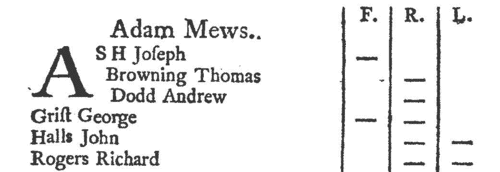
| Inhabitants of Leith, Edinburgh
(1805)
Holden's Triennial Directory of 1805 to 1807 included a provincial section, listing professional people and traders in England, Wales, Scotland and Ireland. (The sample scan here is from the listing for Bath)CATHIE. Cost: £6.00.  | Sample scan, click to enlarge
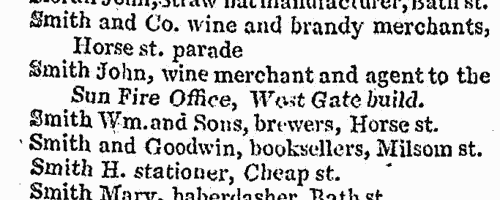
| Traders and professionals in London
(1805)
Holden's Triennial Directory for 1805 to 1807 includes this 'London Alphabet of Businesses, Professions, &c.': coverage is good; about 30,000 individuals are recorded.CATHIE. Cost: £4.00.  | Sample scan, click to enlarge
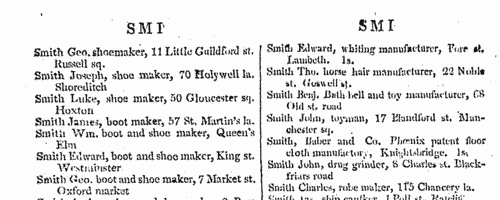
| Scotland Bankrupts and Insolvents
(1820)
Official notices to creditors were published in the Edinburgh Gazette. This is the index to the bankrupts and insolvents. January to December 1820.CATHIE. Cost: £6.00.  | Sample scan, click to enlarge
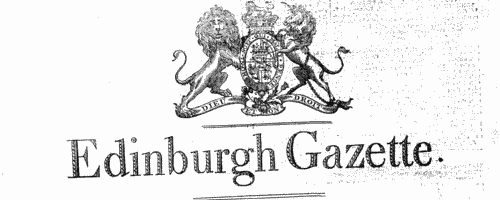
| Scotland Notices to Creditors
(1820)
Official notices to creditors of bankrupts and insolvents were published in the Edinburgh Gazette. This is the index to the stray names of solicitors, writers, agents, creditors and innkeepers mentioned in these notices. January to December 1820.CATHIE. Cost: £6.00.  | Sample scan, click to enlarge
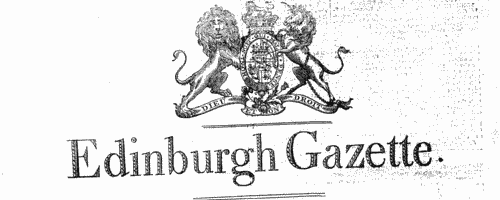
| Glasgow Directory
(1835)
'The Post-Office Annual Directory For 1835-56: Containing An Alphabetical List of the Merchants, Traders, Manufacturers, and Principal Inhabitants: And A Second List of the Names of Merchants, Manufacturers and Traders, in Glasgow and Suburbs, Classed and Arranged under Each Distinct Head of Trade or Profession with A Street Directory: And An Appendix, Containing Many Useful Lists' was published in Glasgow in 1835. This main alphabetical section is from page 21 to 253, and comprises about 11,000 entries.CATHIE. Cost: £4.00.  | Sample scan, click to enlarge

|
Research your ancestry, family history, genealogy and one-name study by direct access to original records and archives indexed by surname.
|













